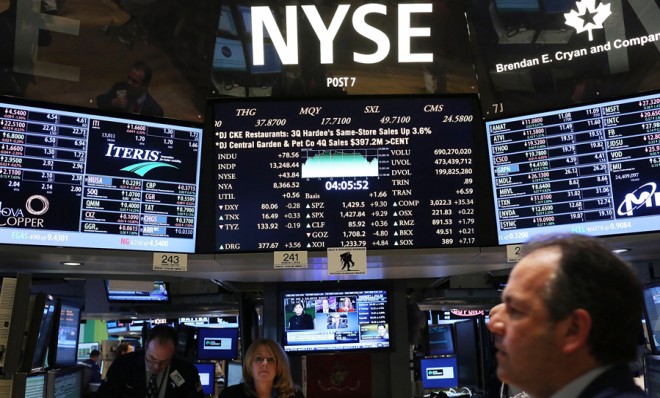Why 'sell in May and stay away' might be terrible investment advice
Like many pieces of age-old wisdom, this little adage doesn't always hold up to scrutiny

A free daily email with the biggest news stories of the day – and the best features from TheWeek.com
You are now subscribed
Your newsletter sign-up was successful
Should you "sell in May and go away," as the old investment advice goes? Or just keep cool and go about your summer?
It's literally a centuries-old question. (It dates back to 1694, to be exact.) The original rhyme, "Sell in May and go away, don't come back till St. Leger Day," refers to the British horse-racing season, when folks relaxed at the track during the summer months while their lightened portfolios simmered on the back burner. The result was fewer people trading — a "thin market" — which meant more volatility, says Britain's Telegraph.
Times have changed, of course. For starters, people now spend most of their summers at work, not the horse track. And almost no one writes rhymes about best practices for Wall Street (unless this counts). But the adage has stuck — and not for nothing. According to Fox Business, "Historically, the stock market has typically been weaker from May to October than it has from November through April. Going back to 1950, the Dow is just about flat from May to October but up over 7 percent on average from November to April."
The Week
Escape your echo chamber. Get the facts behind the news, plus analysis from multiple perspectives.

Sign up for The Week's Free Newsletters
From our morning news briefing to a weekly Good News Newsletter, get the best of The Week delivered directly to your inbox.
From our morning news briefing to a weekly Good News Newsletter, get the best of The Week delivered directly to your inbox.
A study by Ben Jacobsen, an academic from Massey University in New Zealand, found something similar: This seasonal trend was present in 36 of the 37 countries researchers sampled, and especially strong in Europe.
Still, not everyone is convinced. According to the Telegraph:
Adrian Lowcock at Hargreaves Lansdown was unsure of the merits of the St Leger method. "Looking at the statistics over the past 12 years, the picture is pretty balanced," he said. "Fifty per cent of the time it works, 50 per cent it doesn't. Given that the statistics don't present a strong case for it I can think of several reasons not to sell in May."
His reasons included trading costs — which vary depending on the nature of the investment, but also investor psychology, which means that if the shares or funds that you have sold have gone up in the meantime, you may find it mentally very hard to force yourself to buy back in. "If markets do fall, investor confidence may be diminished and be uncomfortable," he also warned. [Telegraph]
What about this particular May? Well, the signals from Wall Street are all over the map. While the market is up 25 percent from last summer's dip, and many companies beat expectations for first quarter profits, the economy is undergoing its fourth consecutive "spring swoon" — a seasonal slowdown in economic growth that historically causes stocks to tumble.
As Sam Stovall, chief investment strategist and head of the investment committee at S&P Capital IQ, tells Forbes, from May to October of the last three years, the S&P 500 declined 16 percent, 19.4 percent, and 9.9 percent, respectively. But this year, he says, bulls are confident that the market will avoid a big decline.
A free daily email with the biggest news stories of the day – and the best features from TheWeek.com
Why? Fox Business's Hilary Kramer offers a bit more insight:
Much of the selling the last three years was caused by the European debt crisis, and that crisis is in a much better place now that the European Central Bank announced that it would buy back government bonds of countries that run into trouble. That safety net is one piece of good news. The second is that no countries have taken advantage of this offer yet. So while Europe's debt problems haven't gone away, they are being better managed. Investors are less fearful about it now than in recent years, and I don't expect an extreme sell-off like we've seen in the past...So for this May especially, I don't think "going away" is a good idea. [Fox Business]
And of course there are those who advise you stay away from yearly sell-offs as a matter of principle. Here's US News' Spencer Rand:
Without an explanation, "sell in May" is a self-fulfilling prophecy at best, which shouldn't leave anyone feeling good about following the strategy. The bottom line is that unless your full-time job is to follow the stock market on a daily basis, long-term investors should avoid this and other market-timing strategies. You're better off leaving your portfolio fully invested — have no fear, enjoy the year. [US News]
The upshot? You probably shouldn't reflexively base your investment strategy on 17th-century rhymes.
Carmel Lobello is the business editor at TheWeek.com. Previously, she was an editor at DeathandTaxesMag.com.
-
 Switzerland could vote to cap its population
Switzerland could vote to cap its populationUnder the Radar Swiss People’s Party proposes referendum on radical anti-immigration measure to limit residents to 10 million
-
 Political cartoons for February 15
Political cartoons for February 15Cartoons Sunday's political cartoons include political ventriloquism, Europe in the middle, and more
-
 The broken water companies failing England and Wales
The broken water companies failing England and WalesExplainer With rising bills, deteriorating river health and a lack of investment, regulators face an uphill battle to stabilise the industry